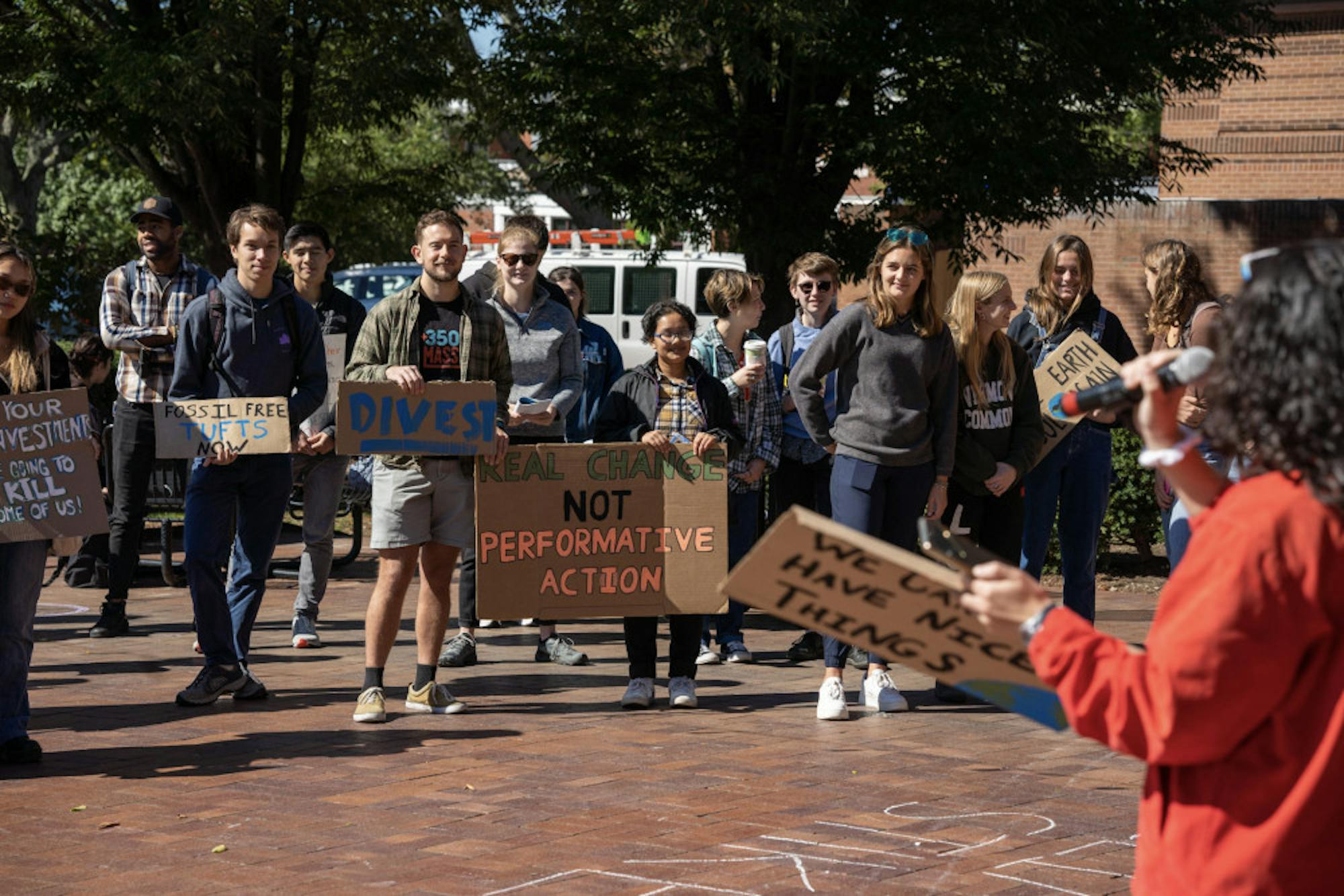Tufts Climate Action held a rally last Friday at the Mayer Campus Center Lower Patio to demand that the university fully divest from its fossil fuel holdings. The rally drew 50–75 attendees, making it one of the largest climate demonstrations on Tufts’ campus in the last three years, organizers said.
Senior Julia Silberman, one of the leaders of Tufts Climate Action, believes Tufts has not done enough to divest from fossil fuels, calling the university’s lack of action “disappointing.”
“We thought this would be the moment that Tufts divested, but … there was really nothing they actually did,” Silberman said.
The university formed a Responsible Investment Advisory Group in 2019 to evaluate its investment decisions, following calls from campus activists at the time. In 2021, in response to the RIAG’s recommendations, Tufts banned direct investment in coal and tar sands companies.
Patrick Collins, the executive director of media relations at Tufts, shared a statement with the Daily countering that the university is taking steps to limit its investment in fossil fuels and reduce its carbon footprint.
“Our investment approach has included restricting the endowment from directly investing in coal and tar sands companies, taking steps to reduce indirect investments in them, and making significant investments in funds that will have a positive impact on the trajectory and impact of climate change,” Collins wrote in an email to the Daily.
Silberman said that many activists felt that the university had tried to co-opt their movement following the school’s announcement that it would divest from coal and tar sands companies, ignoring the work students had done to push them.
“[Tufts was] marketing it like they had done something groundbreaking when they really weren’t,” Silberman said. “There was absolutely no mention of 10 years of activism.”
Despite frustration on the part of student climate activists such as Silberman, the university maintains that it is slowly working towards their decarbonization goals.
“The university has pledged to reduce its carbon footprint to meet President Monaco’s 2016 commitment for Tufts to be carbon neutral as soon as possible, but no later than 2050,” Collins wrote. “Tufts’ Medford/Somerville and Grafton campuses already have plans to decarbonize their buildings and the Sustainability Council has drafted a new vision, key principles and goals to guide sustainability at the university.”
Organizers also urged Tufts to reject research funding from the fossil fuel industry. Daniel Barszczak, a sophomore who attended the protest, spoke about the corrosive influence fossil fuel companies can have on critical research coming out of some of the world’s premier universities.
“The most egregious example in my opinion is the MIT Energy Initiative. If you go to their website [and] if you go to their members’ page, half the companies … are oil companies,” Barszczak said.
Protesters demanded that Tufts develop a plan to achieve decarbonization, and organizers called on Tufts leadership to commit to climate justice.
Organizers hope that the next university president will play a significant role in the fight against climate change.
“The next president should be someone who commits to using their role to ensure Tufts is a leader in climate action and climate justice,” Silberman said in a speech to protesters. “This means using Tufts’ resources to support vulnerable frontline communities, and to expand education, research and opportunities in the climate field.”
Parke Wilde, a professor at Tufts’ Friedman School of Nutrition Science and Policy, spoke to the crowd about the importance of cooperation between older and younger generations.
“Sometimes our elders have the sense that … hope comes from sweet stories that everything is going to be alright,” Wilde said. “Hope doesn’t require us to tell untruths about our future — hope comes from action.”
Wilde told the Daily that his research and his students’ passion about climate action inspired his decision to attend the protest.
“Climate is involved in my life as a faculty researcher because I teach about U.S. food policy,” Wilde said. “But what really has me out here today is recognition that teaching and research are not enough, that we need a vision of social change — and I hear that from students.”
Besides Tufts students and faculty, protesters included representatives from Fridays for Future Boston, an offshoot of the climate strike movement started by Greta Thunberg, Extinction Rebellion Boston and Mass 350. Members of Fossil Free Research, a group that pushes universities to exclude fossil fuel money when funding their research work, also attended. Attendees also included representatives from climate groups at Wellesley College, Olin College, Harvard University and Boston College.
After several speeches and chants, senior Emily Witherell, one of the leaders of Tufts Climate Action, and Silberman led a march to Ballou Hall, where President Monaco’s office is located. Six TUPD officers stood outside Ballou during the protest, telling the Daily they were present only as a precautionary measure.
Although Silberman will graduate this year, she told the Daily she is hopeful about the future of the divestment movement.
“We’ve heard a lot of growing support from administration members, quietly,” she said. “I’ve talked to [first-years], they all know what fossil fuel divestment is and they are immediately supportive. … The baseline opinions on climate justice have shifted, and I think we’re going to win.”






